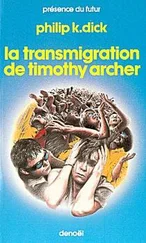Philip Dick - The Transmigration of Timothy Archer
Здесь есть возможность читать онлайн «Philip Dick - The Transmigration of Timothy Archer» весь текст электронной книги совершенно бесплатно (целиком полную версию без сокращений). В некоторых случаях можно слушать аудио, скачать через торрент в формате fb2 и присутствует краткое содержание. Жанр: Фантастика и фэнтези, на английском языке. Описание произведения, (предисловие) а так же отзывы посетителей доступны на портале библиотеки ЛибКат.
- Название:The Transmigration of Timothy Archer
- Автор:
- Жанр:
- Год:неизвестен
- ISBN:нет данных
- Рейтинг книги:4 / 5. Голосов: 1
-
Избранное:Добавить в избранное
- Отзывы:
-
Ваша оценка:
- 80
- 1
- 2
- 3
- 4
- 5
The Transmigration of Timothy Archer: краткое содержание, описание и аннотация
Предлагаем к чтению аннотацию, описание, краткое содержание или предисловие (зависит от того, что написал сам автор книги «The Transmigration of Timothy Archer»). Если вы не нашли необходимую информацию о книге — напишите в комментариях, мы постараемся отыскать её.
The Transmigration of Timothy Archer — читать онлайн бесплатно полную книгу (весь текст) целиком
Ниже представлен текст книги, разбитый по страницам. Система сохранения места последней прочитанной страницы, позволяет с удобством читать онлайн бесплатно книгу «The Transmigration of Timothy Archer», без необходимости каждый раз заново искать на чём Вы остановились. Поставьте закладку, и сможете в любой момент перейти на страницу, на которой закончили чтение.
Интервал:
Закладка:
Still, upon the lessening of my original anger, I felt sympathy toward Bill because I understood why he had gone this route; he had not willed it out of perversity: it did not consist of, so to speak, optional madness but, rather, madness compelled on him, thrust onto him forcibly, whether he liked it or not. It had simply happened.
Bill Lundborg, the first of us to be crazy, had become now the last of us to be crazy; the only genuine issue could best be phrased this way: could anything be done about it? Which raises a deeper question: should anything be done about it?
I pondered that during the next couple of weeks. Bill (he told me) had no major friends; he lived alone in a rented room in East Oakland, eating his meals at a Mexican cafe. Perhaps, I said to myself, I owe it to Jeff and Kirsten and Tim-to Tim, especially-to straighten Bill out. That way, there would be a survivor. That is, of course, in addition to myself.
Indubitably, I had survived. But survived, as I had for some time realized, as a machine; still, this is survival. At least my mind had not been invaded by alien intelligences who thought in Greek, Latin and Hebrew and used terms I could not comprehend. Anyhow, I liked Bill; it would not be a burden on me to see him again, to spend time with him. Together, Bill and I could summon back the people we had loved; these were the same people we had known, and our pooled memories would yield up a great crop of circumstantial details, the little bits that made of memory the semblance of the veridical ... which is an ornate way of saying that my seeing Bill Lundborg would make it possible for me to experience Tim and Kirsten and Jeff again because Bill, like me, had once experienced them and would understand who I was talking about.
Anyhow, we both were attending Edgar Barefoot's seminar; Bill and I would run into each other there, for better or worse. My respect for Barefoot had climbed, due, of course, to the personal interest he had taken in me. I had warmed to that; I needed that. Barefoot had sensed it.
I interpreted Bill's statement that the bishop had been interested in me sexually as an oblique way of saying that he himself was interested in me sexually. I pondered that and came to the conclusion that Bill was too young for me. Anyhow, why get involved with someone classified as a hebephrenic schizophrenic? Hampton, who had had traces-rather more than traces-of paranoia and hypomania had been enough trouble, and it had been difficult to rid myself of him. In fact, it was not demonstrable that I had gotten rid of him; Hampton still phoned me, complaining aggressively that when I kicked him out of my house I had kept certain choice records, books and prints that, in truth, belonged to him.
What bothered me about my getting involved with Bill lay in my sense of the ferocity of madness. It can consume its owner, leave him, look around for more. If I was a rickety machine, I stood in danger of that madness, for I was not all that psychologically intact. Enough people had gone mad and died already; why add myself to the list?
And, perhaps worst of all, I discerned the kind of future that awaited Bill. He had no future. Someone with hebephrenia has dealt himself out of the game of process, growth and time; he simply recycles his own nutty thoughts forever, enjoying them even though, like transmitted information, they degenerate. They become, finally, noise. And the signal that is intellect fades out. Bill would know this, having planned at one time to become a computer programmer; he would be familiar with Shannon's information theories. This is not the sort of thing you want to tie into.
Bringing my little brother Harvey along, I picked up Bill on my day off and drove up into Tilden Park, by Lake Anza and the clubhouse and barbecue stoves; there the three of us broiled hamburgers, and we tossed a Frisbie around and had a hell of a time. We had brought a Ghetto-blaster with us-one of those super sophisticated two-channel two-speaker combination radio and tape deck masterpieces that Japan turns out-and we listened to the rock group Queen and we drank beer, except for Harvey, and ran around and then, when it didn't seem anyone was watching or cared, Bill and I shared a joint. Harvey, while we did that, tried out all the heat-sensor controls of the Ghetto-blaster and then concentrated on picking up Radio Moscow on its shortwave.
"You can go to jail for that," Bill told him. "Listening to the enemy."
"Bull," Harvey said.
"I wonder what Tim and Kirsten would say," I said to Bill, "if they could see us now."
"I can tell you what Tim is saying," Bill said.
"What does he say?" I said, relaxed by the marijuana.
Bill said, "He says that-he's thinking that-it is peaceful here and he has finally found peace."
"Good," I said. "I could never get him to smoke grass."
"They smoked it," Bill said. "Him and Kirsten, when we weren't around. He didn't like it. But he likes it now."
"This is very good grass," I said. "They probably had local stuff. They wouldn't know the difference.", I pondered over what Bill had said. "Did they really turn on? Is that true?"
"Yes," Bill said. "He's thinking about that now; he's remembering."
I regarded him. "In a way, you're lucky," I said. "To find your solution. I wouldn't mind having him in me. In my brain, I mean." I giggled; it was that kind of grass. "Then I wouldn't be so lonely." And then I said, "Why didn't he come back to me? Why to you? I knew him better."
After a moment of reflection, Bill said, "Because it would have wrecked you. See, I'm used to voices in my head and thoughts that aren't my own; I can accept it."
"It's Tim that's the bodhisattva, not you," I said. "It was Tim who came back, out of compassion." And then I thought with a start: My God; do I believe it, now? When you're high on good grass, you can believe anything, which is why it sells for as much as it does, now.
"That's right," Bill said. "I can feel his compassion. He sought wisdom, the Holy Wisdom of God, what Tim calls Hagia Sophia; he equates it with anokhi, God's pure consciousness. And then, when he got there and the Presence entered him, he realized that it was not wisdom that he wanted but compassion ... he already had wisdom but it hadn't done him or anyone else any good."
"Yes," I said, "he mentioned Hagia Sophia to me."
"That's some of the Latin he thinks in."
"Greek."
"Whatever. Tim thought that with Christ's absolute wisdom he could read the Book of the Spinners and untangle the future for Tim, so Tim could figure out a way to evade his fate; that's why he went to Israel."
"I know," I said.
"Christ can read the Book of the Spinners," Bill said. "The
fate of every human is inscribed in it. No human being has ever read it."
"Where is this book?"
"All around us," Bill said, "I think, anyhow. Wait a sec;
Tim is thinking something. Very clearly." He remained silent and withdrawn for a time. "Tim is thinking, 'The last canto. Canto Thirty-three of Paradiso.' He's thinking, ' "God is the book of the universe" ' and you read that; you read it the night you had the abscessed tooth. Is that right?" Bill asked me.
"That's right," I said. "It made a great impression on me, that whole last part of the Commedia. "
"Edgar says that the Divine Comedy is based on Sufi sources," Bill said.
"Maybe so," I said, wondering about what Bill had said, the statements about Dante's Commedia. "Strange," I said. "The things you remember and why you remember them. Because I had an abscessed tooth-"
"Tim says that Christ arranged that pain," Bill said, "so the final part of the Divine Comedy would impress itself on you in a way that would never wear off. 'One simple flame.' Oh, shit; he's thinking in a foreign language again."
"Say it out loud," I said, "as he thinks it."
Читать дальшеИнтервал:
Закладка:
Похожие книги на «The Transmigration of Timothy Archer»
Представляем Вашему вниманию похожие книги на «The Transmigration of Timothy Archer» списком для выбора. Мы отобрали схожую по названию и смыслу литературу в надежде предоставить читателям больше вариантов отыскать новые, интересные, ещё непрочитанные произведения.
Обсуждение, отзывы о книге «The Transmigration of Timothy Archer» и просто собственные мнения читателей. Оставьте ваши комментарии, напишите, что Вы думаете о произведении, его смысле или главных героях. Укажите что конкретно понравилось, а что нет, и почему Вы так считаете.










